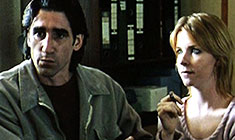|
|
|
|
Angel Baby
|
 |
|
In
a terrific article published in 1980, Meaghan Morris suggested that, in
Australian cinema, “there is little or no glorification of full-blown romantic
love ... and none of the heightened respect for the eternal drama of the couple
that defines so much European and American cinema”.
Since
those wise words were written, local movies have tended to place their love
stories within the larger context of families and communities (as in Strictly
Ballroom, 1992), or within
self-immolating subcultures (Romper Stomper, 1992). Or they go the way of All Men Are Liars (1995), where romance
is dreamed of in a misty way – but finally derided as if it were some unreal
import from a dubious foreign country.
Michael
Rymer’s Angel Baby has a much more
European, Nouvelle Vague flavour, echoing low-life romances as diverse as Betty Blue (1986), Les Amants du Pont-Neuf (1991)
and Jerry
Schatzberg ’s drug movie The
Panic in Needle Park (1971). Here, the lovers – Harry (John Lynch) and Kate
(Jacqueline McKenzie) – form a grand, inseparable couple, opposed to just about
everyone and everything else in the world. So this is a rare thing: an
Australian tale of amour fou, mad
love.
Madness
in a real sense – i.e., mental disorder – plays a big part in Angel Baby. Harry and Kate meet in a
clinic where they are both receiving treatment for schizophrenia. Their
ecstatic love appears to give them renewed strength and courage. So they move
in together; Harry gets a job, Kate becomes pregnant. Catastrophe knocks after
they decide to throw away their medication. But this is not a social-problem
piece about issues of mental illness. Its focus is purely on the inner,
emotional life of this couple, on a roller coaster ride from heaven to hell.
Rymer's script has the boldness to dramatise the various delusions and
compulsions of this pair without passing any normative moral judgment.
The
film’s most absorbing aspects are, in fact, those that are furthest removed
from the reassuring banalities of daily life and its dreary reality-principle. A
surrealist influence is evident: Melbourne is filmed as if it were the Paris of
André Breton’s or Louis Aragon’s classic 1920s novels. And speaking of
surrealism: in a variation on Salvador Dalí’s artistic method of paranoiac
criticism, Kate believes that the TV program Wheel of Fortune (!) sends her personal, destiny-deciding messages.
She also believes that anyone who gets a drop of her blood steals her soul, and
that hospitals should be avoided at all cost. Harry – who has his own inner
voices to contend with – loves Kate so much that he dutifully takes on every last
one of her delusions.
Angel Baby at times achieves a
genuinely surreal and hallucinatory dramatic power, because it invests a
quality of truth into the visions experienced by this wayward pair. Only in the
scenes where Harry visits his old chums at the clinic does it fall into a more
vulgar, sensationalist depiction of mental disorder, akin to lurid Hollywood
melodramas such as The Snake Pit (1948). Generally, though, I think Rymer gets away with his dodgy, potentially offensive
central idea: extreme mental states as a metaphor for grand passion.
For
the work of a first-time director, Angel
Baby achieves a remarkable consistency of tone and texture. This is due in
part to the luminous cinematography of Ellery Ryan (That Eye, the Sky, 1995), and
also the dreamy atmosphere created by a patchwork soundtrack mixing original
music by John Clifford White with various ambient pieces by Brian Eno and
others.
Lynch
is absolutely riveting as Harry; he has the intensity and intricacy of a
performer from John Cassavetes’ cinema. I had more trouble accepting McKenzie's
very studied turn as Kate. Her character has to be the more disturbed and
hysterical of the two, and this has led McKenzie to an extremely mannered,
distancing mode of performance.
If
I have a nagging doubt about Angel Baby,
it is that the film seems, ultimately, a bit pointless. I mean this criticism
in a strict, aesthetic sense: it lacks a central theme or idea that might give
the stations of its compelling story a greater and more satisfying coherence.
Yet, even that pointless quality can be construed as charmingly European. This
is a film of mood, of character, of emotion – rather than of ideas. And on
these more immediate and sensual levels, Angel
Baby is, in the Australian context, a welcome success.
MORE
amour fou: Head-On (2004)
© Adrian Martin May / October / December 1995 |
![]()